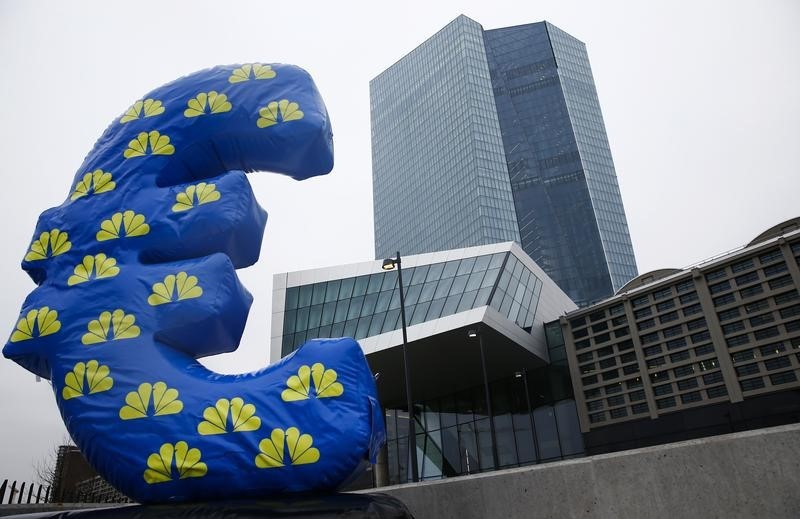By Marius Zaharia
LONDON(Reuters) - Financial markets are betting that the threat of deflation in the euro zone has all but evaporated, calling into doubt forecasts that benchmark German government bond yields could drop to zero or even below.
A shift across European markets this week saw the euro chalk up its biggest rally in 3-1/2 years and the biggest rise in German yields for more than two.
Above-forecast April inflation figures in Germany on Wednesday - albeit still only 0.3 percent - were a major factor behind the surge yields.
One-year euro inflation swaps, which allow investors to protect themselves against the risk of rising prices, rose 10 basis points to 1.11 percent after the data, up from almost minus 1 percent at the start of the year.
Two-year swaps hit 1 percent, having fallen below zero in January.
Short-term inflation expectations have picked up as the euro zone economy has shown signs of gradual improvement, including the first expansion in private lending in three years, and reflects an almost 50 percent rise in oil prices from a low of $45 in January.
"Deflationary risks have definitely receded," said Martin van Vliet, senior rate strategist at ING. "But the market still thinks that in the long term the ECB will have difficulty meeting its target."
The European Central Bank will welcome this and a further pick-up in inflation as evidence its 1 trillion euro money printing scheme, launched to ward off the threat of a Japan-style cycle of persistently falling prices, is working.
But faster price growth could threaten a three-year-long trend of falling euro zone borrowing costs, particularly in Germany, where only last week 10-year Bund yields seemed destined to drop to zero or below.
Five-year, five-year euro breakeven forwards last traded at 1.76 percent. These measure where the market expects 2025 inflation forecasts to be in 2020 and are the ECB's preferred measure of the market's long-term expectations.
The number is fractionally below the year's highest, touched just before the ECB launched its quantitative easing programme, but still below the ECB inflation target of just under 2 percent.
Even 50-year inflation swaps, at 1.89 percent show markets do not see inflation returning to target for the foreseeable future.
DOUBTS
Yet, the bounce in short-term expectations is bringing into question a long-held view that ECB purchases would keep pushing yields lower, potentially turning Bund yields negative.
Ten-year Bund yields rose close to pre-QE levels of 0.38 percent on Thursday, having hit a record low 0.05 percent last week.
"(This) highlights the possibility that Bund yields would start trading at higher levels simply because the economy looks in better shape," said Elwin de Groot, market economist at Rabobank.
"Those investors that were convinced that yields would fall to zero or even beyond ... will now have doubts. Maybe this volatility itself, which is unlikely to disappear in the near term, may require higher yields."
It is too early to conclude that Bund yields will never reach zero. That would require sustained economic recovery.
Many euro zone countries have debts bigger than their economies, making it hard for governments to support the recovery. Greece's future in the euro zone is still in doubt.
And short-term inflation expectations depend significantly on oil price moves.
That leaves some seeing the recent moves as short-lived.

"We expect downward surprises in inflation in the summer. We're not out of the woods yet. We think the current sell-off ... is a temporary shake out, and we still expect deeply negative rates in 10-year Bunds," said RBS (LONDON:RBS) rates analyst Marco Brancolini